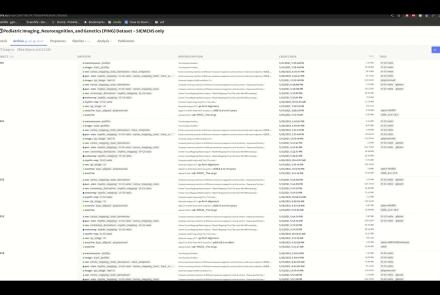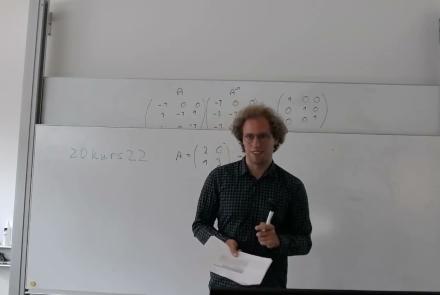Research Resource Identifiers (RRIDs) are ID numbers assigned to help researchers cite key resources (e.g., antibodies, model organisms, and software projects) in biomedical literature to improve the transparency of research methods.
Difficulty level: Beginner
Duration: 1:01:36
Speaker: : Maryann Martone
Course:
This lesson gives an introduction to high-performance computing with the Compute Canada network, first providing an overview of use cases for HPC and then a hands-on tutorial. Though some examples might seem specific to the Calcul Québec, all computing clusters in the Compute Canada network share the same software modules and environments.
Difficulty level: Beginner
Duration: 02:49:34
Speaker: : Félix-Antoine Fortin
Course:
This talk presents an overview of CBRAIN, a web-based platform that allows neuroscientists to perform computationally intensive data analyses by connecting them to high-performance computing facilities across Canada and around the world.
Difficulty level: Beginner
Duration: 56:07
Speaker: : Shawn Brown
Course:
This lecture presents an overview of functional brain parcellations, as well as a set of tutorials on bootstrap agregation of stable clusters (BASC) for fMRI brain parcellation.
Difficulty level: Advanced
Duration: 50:28
Speaker: : Pierre Bellec
Course:
This short video walks you through the steps of publishing a dataset on brainlife, an open-source, free and secure reproducible neuroscience analysis platform.
Difficulty level: Beginner
Duration: 1:18
Speaker: :
Course:
This video shows how to use the brainlife.io interface to edit the participants' info file. This file is the ParticipantInfo.json file of the Brain Imaging Data Structure (BIDS).
Difficulty level: Beginner
Duration: 0:34
Speaker: :
Course:
This video will document the process of running an app on brainlife, from data staging to archiving of the final data outputs.
Difficulty level: Beginner
Duration: 3:43
Speaker: :
Course:
This video will document the process of visualizing the provenance of each step performed to generate a data object on brainlife.
Difficulty level: Beginner
Duration: 0:21
Speaker: :
Course:
This video will document the process of downloading and running the "reproduce.sh" script, which will automatically run all of the steps to generate a data object locally on a user's machine.
Difficulty level: Beginner
Duration: 3:44
Speaker: :
Course:
This brief video walks you through the steps necessary when creating a project on brainlife.io.
Difficulty level: Beginner
Duration: 1:45
Speaker: :
Course:
This brief video rus through how to make an accout on brainlife.io.
Difficulty level: Beginner
Duration: 0:30
Speaker: :
Course:
This video will document how to run a correlation analysis between the gray matter volume of two different structures using the output from brainlife app-freesurfer-stats.
Difficulty level: Beginner
Duration: 1:33
Speaker: :
Course:
As a part of NeuroHackademy 2020, this lecture delves into cloud computing, focusing on Amazon Web Services.
Difficulty level: Beginner
Duration: 01:43:59
Speaker: : Tara Madhyastha, Andrew Crabb, Ariel Rokem
Introduction of the Foundations of Machine Learning in Python course - Day 01.
High-Performance Computing and Analytics Lab, University of Bonn
Difficulty level: Beginner
Duration: 35:24
Speaker: : Elena Trunz
Optimization for machine learning - Day 02 lecture of the Foundations of Machine Learning in Python course.
High-Performance Computing and Analytics Lab, University of Bonn
Difficulty level: Advanced
Duration: 34:52
Speaker: : Moritz Wolter
Linear Algebra for Machine Learning - Day 03 lecture of the Foundations of Machine Learning in Python course.
High-Performance Computing and Analytics Lab, University of Bonn
Difficulty level: Advanced
Duration: 57.45
Speaker: : Moritz Wolter
Support Vector Machines - Day 06 lecture of the Foundations of Machine Learning in Python course.
High-Performance Computing and Analytics Lab, University of Bonn
Difficulty level: Advanced
Duration: 53.39
Speaker: : Elena Trunz
Decision Trees and Random Forests - Day 07 lecture of the Foundations of Machine Learning in Python course.
High-Performance Computing and Analytics Lab, University of Bonn
Difficulty level: Advanced
Duration: 1:15:39
Speaker: : Elena Trunz
Clustering and Density Estimation - Day 08 lecture of the Foundations of Machine Learning in Python course.
High-Performance Computing and Analytics Lab, University of Bonn
Difficulty level: Advanced
Duration: 59:35
Speaker: : Elena Trunz
Dimensionality Reduction - Day 09 lecture of the Foundations of Machine Learning in Python course.
High-Performance Computing and Analytics Lab, University of Bonn
Difficulty level: Advanced
Duration: 51:02
Speaker: : Elena Trunz
Topics
- Artificial Intelligence (5)
- Philosophy of Science (5)
- Provenance (2)
- Notebooks (1)
- protein-protein interactions (1)
- Extracellular signaling (1)
- Animal models (2)
- Assembly 2021 (27)
- Brain-hardware interfaces (12)
- Clinical neuroscience (10)
- International Brain Initiative (2)
- Repositories and science gateways (5)
- Resources (6)
- General neuroscience
(10)
- Phenome (1)
- (-)
General neuroinformatics
(12)
- Computational neuroscience (81)
- Statistics (2)
- Computer Science (5)
- (-) Genomics (24)
- Data science
(16)
- (-) Open science (23)
- Project management (3)
- Education (2)
- Neuroethics (7)



















